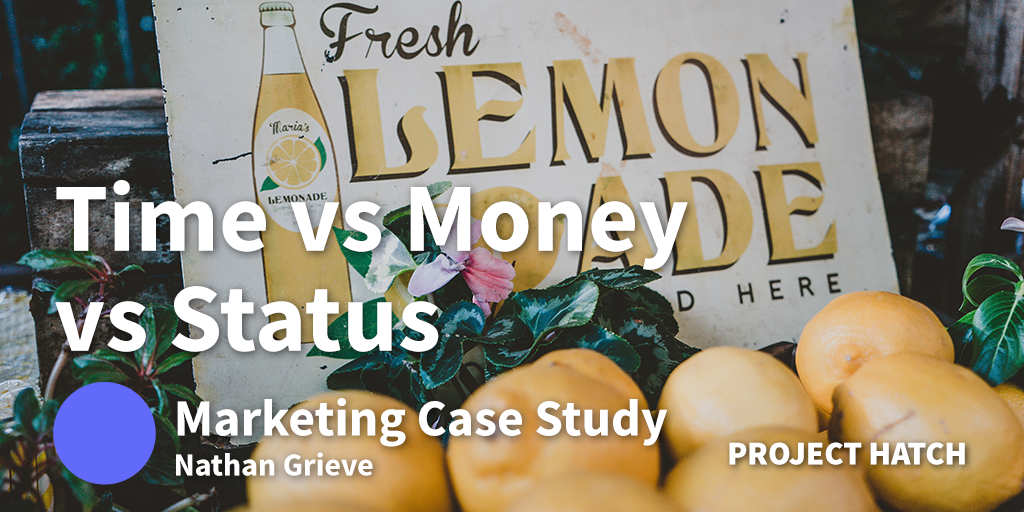This post evaluates 3 case studies an their results to determine whether focusing on time or money will suit your business better.

Brands often position themselves around how customers spend their time and money.
Beer brand Miller launched their "Miller Time" campaign in 1971. It is an ad that plays into the work hard, play hard mentality - they managed to associate themselves with the time their customers spend enjoying themselves after work.
Citibank was selling equity loans - last resort loans that mean adding a second mortgage to your house. The slogan they used for this was "live richly". It was an ad they spent $1 billion promoting and create an image of the life you will be able to enjoy by spending money.
"The reason it seems that price is all your customers care about is that you haven't given them anything else to care about" - Seth Godin
But how much research is there to actually back up the methods of these marketers and which matters more, time or money?
Time vs Money - Personal Happiness
This concept is highlighted with charitable donations. Would you rather donate your time or money?
Most people chose to donate time - especially if they want to be seen as moral. Additionally, asking people how they spent time working with a charity generates feelings of happiness in the interviewee rather than asking about money.
People consider the way they spend their time as more reflective of their personal identity than the way in which they spend money.
"More money does not necessarily buy more happiness, but less money is associated with emotional pain."
In terms of happiness, money has its place, but there's a limit.
Research suggests that more money is associated with greater daily happiness up to an approximate annual income of USD$75,000. Below this people reported decreasing happiness and increasing sadness and stress. Beyond $75,000, money is important for life evaluation (how accomplished you feel, e.g. college graduates have higher life evaluation), but has little impact on happiness, enjoyment, sadness, or stress.
Time vs Money - Consumer Happiness
Open a magazine or look at a billboard and chances are you will see marketing based around how you spend your time or money. Whether you are looking at watches or banking advertisements - marketers will get you to question how you spend your time and money.
But which of these adverts are most effective?
Cassie Mogilner and Jennifer Aaker tried to find out. Here is what they found.
The Lemonade Stand
In a preliminary experiment, the researchers investigated the wording of lemonade stand signs to see if they had any effect on purchase price and feeling. The signs read:
"Spend a little time, and enjoy some C&D's lemonade."
"Spend a little money, and enjoy C&D's lemonade"
"Enjoy C&D's lemonade"
Customers were allowed to choose what they paid, between $1-3, and to add realism, two of the co-author's 6-year-old sons got involved.
They found that 14% of passersby purchased lemonade with the sign that mentioned time (against 7% for the money sign and 9% for the control group) and paid more for it giving an average of $2.50 against $1.38 for the money condition and $2.18 in the control.
Time won. But why?
Their next experiments were designed to find out.
Laptop
Forty-two Berkeley students were primed using one of two questions.
How much time have you spent fixing your laptop?
How much money have you spent fixing your laptop?
Participants were asked to give an answer on a scale from 1 (none) - 7 (a lot) before being asked to explain their thoughts on their laptop.
They found that users who were primed to think about the time spent working on their laptops thought more favourably about them.
It appears to show that when consumers think about time invested in a product they think more favourably about it. In this case, even though the time is also associated with a cost time invested in a product appears to show favourability.
Designer Jeans
The above two experiments showcased products where use is more important than possession. What would happen if objects of status were used instead? Are there circumstances where spending money and owning a product is more gratifying than spending time with it?
Students taking part in the experiment were primed similarly to laptop experiment. This time the students were asked about how much time and money they had spent going to restaurants or on designer jeans in the past year. Students were then asked to rate their attitude towards their purchases.
As expected, the students rated the restaurant purchases as more experiential and rated their time more highly when they were primed to think of the time spent at the restaurant instead of the cost.
With the designer jeans, students rated their possessions more highly when they were primed to think about the money they spent on the product.
What does this mean?
You need to identify how your customer receives your product - are they looking for an experience where spending time enjoying your product is more important. Or are they looking for a status symbol they can show off - a product where your customer enjoys the thought of the money they spent on it.
"Brands can cultivate consumer relationships by first considering how consumers most identify with the product (through experience or possession) and then highlighting either their time or money spent accordingly."
I hope this has helped you understand how consumers think. Cassie Mogilner conducted this research with her professor, Jennifer Aaker as part of her dissertation whilst at Stanford.
To see more of their research check out their scholar pages, Cassie Mogilner, Jennifer Aaker.

